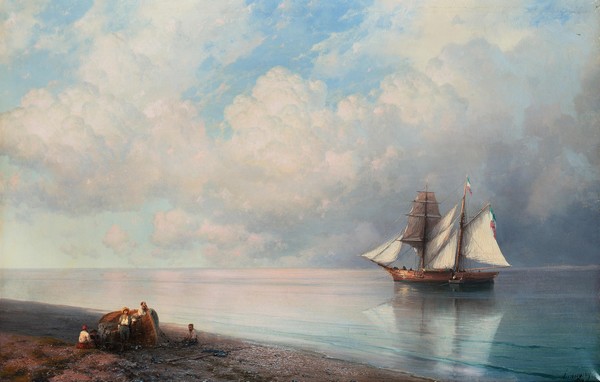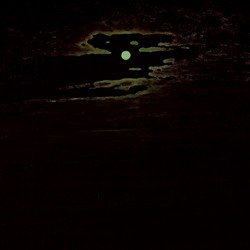
Last week we said goodbye until next year to the students of the Master in Lied of the ESMUC, next week we'll start to talk about the recitals of the Schubertíada and in the meantime, I propose a trip by sea that, as you will see, is not a pleasure trip.
The arrangements of traditional songs are usual in the composers' catalogs, and we heard on Liederabend a few so far, the last one being Deep River, a plantation song harmonized by Harry T. Burleigh. We've heard folk songs by Brahms, Schumann, Lutosławski or Dvořák, and I selected three of them for the "Related Articles" section below (by the way: do you find this section useful, do you (re)read the articles sometimes, or never, or didn't you even realize it was there...?). Contemporary composers continue to arrange traditional works; a couple of years ago we listened to Bernat Vivancos' version of El cant dels ocells (Song of the Birds) and this week I'm sharing an arrangement made in 2000, Ten thousand miles away. The author is Steven Mark Kohn, a versatile American composer (he writes soundtracks, music for commercials, Art Song, and also opera libretti) who has three American Folk Set collections; our song was released in the first one.
Ten thousand miles away is an Irish song referenced in several collections of sea shanties, the sailor work songs that helped to synchronize the labors made for a group of men, such as rowing. There were sea shanties for every occasion; they made hard tasks easier and reinforced comradeship among the crew during the leisure time. Richard Wagner composed the most famous operatic recreation of sea shanties for The Flying Dutchman, but we shouldn't forget those that Benjamin Britten included in the great Billy Budd.
It seems that the origin of Ten thousand miles away is known; it's attributed to a gentleman named Joseph B. Geoghegan, who composed it in the mid-nineteenth century to sing it in the music hall where he worked (in that Victorian times, music hall was theater and music, what we know as a variety arrived later). The song would have quickly gone from theater to street singers and from there to ships. I would say that folk or pop arrangements were made during the 20th century, but the only classical arrangement I know is the one we're listening this week. I also found a reference to another one, written by American composer Ruth Crawford Seeger during the 1920s, but any recording (if the music of Where Have All the Flowers Gone? came to mind when you read the surname Seeger, yes, we are talking about the same family).
The song is about a man who will set sail to reunite with his beloved, but, as I told you before, it won't be a pleasure trip. The girl has been transported, ten thousand miles is the distance between England an Australia. I'm putting here a verse of the song (from a different version of that of Kohn), which specifies that the girl embarks on shackles (and now, the operatic reference is the unfortunate Manon Lescaut, transported to Louisiana).
Dark and dismal was the day
When last I saw my Meg,
She'd a government-band around each hand,
And another round her leg,
And another round her leg, my boys;
As the good ship left the bay
"Adieu," said she, "Remember me
Ten thousand miles away."nal
Transportations to the Australian colonies began after the American Revolutionary War. During the first decades, it was the punishment for people convicted of misdemeanours (what a disproportionate punishment!); later, it was also occasionally applied to crimes punishable by death (more than two hundred). If we pay attention to literature and films, it was a measure of grace in this case; paying attention to these references as well, our Meg had probably stolen to eat.
But this sad story is hidden in the version we're listening, which has only two stanzas with itch chorus. I find really beautiful this song, that's also really well sung by a young baritone I discovered not long ago, Will Liverman; we will keep track of his career. He is accompanied by pianist Jonathan King.
Sing I for a brave
and a gallant barque,
for a stiff and a rattling breeze,
A bully crew
and a captain true,
to carry me o’er the seas.
To carry me o’er the seas,
my boys, to my true love so gay,
Who went on a trip
on a government ship,
ten thousand miles away.
Oh, blow ye winds, hi oh!
A roaming I will go.
I’ll stay no more
on England’s shore,
so let the music play.
I’ll start by the morning train,
to cross
the raging main!
For I’m on the road
to my own true love,
ten thousand miles away.
My true love she was handsome.
My true love she was young.
Her eyes were blue as the violet’s hue,
and silvery was the sound of her tongue.
And silvery was the sound of her tongue,
my boys,
and while I sing this lay,
She’s a doing of the grand
in a far off land,
ten thousand miles away.
Oh, blow ye winds, hi oh!
A roaming I will go.
I’ll stay no more
on England’s shore,
so let the music play.
I’ll start by the morning train,
to cross
the raging main!
For I’m on the road
to my own true love,
ten thousand miles away.

















Comments powered by CComment